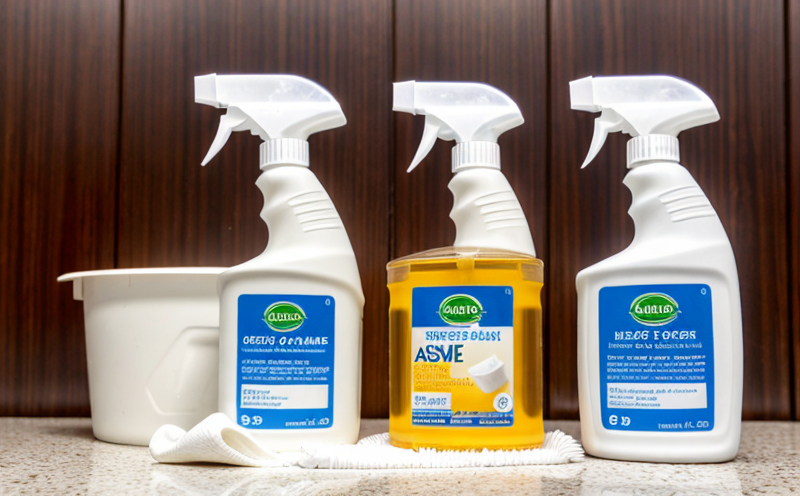CFR 178 Hygiene Product Additive Safety Testing
The Code of Federal Regulations (CFR) Title 21, Part 178 outlines the safe use and application of indirect food additives. This includes ingredients used in packaging materials, containers, processing aids, and utensils that come into contact with food during preparation or consumption. In the context of hygiene products, this regulation ensures that any additive used in these products does not pose a threat to human health.
For companies developing or manufacturing hygiene products, compliance with CFR 178 is essential for ensuring product safety and regulatory adherence. This service focuses on the rigorous testing of additives used in hygiene products to confirm their safety according to these stringent regulations.
The process begins with a thorough understanding of the additive's intended use within the product. Our laboratory team will then select appropriate tests based on the specific application, including biodegradability, toxicity, and potential for allergens or other harmful substances. This approach ensures that our clients can confidently market their products knowing they meet regulatory requirements.
Our state-of-the-art facilities are equipped with advanced analytical instruments capable of detecting even trace amounts of contaminants. We also employ expert chemists who stay current on all relevant standards and guidelines to ensure accurate interpretations of test results. By leveraging this expertise, we can provide comprehensive reports that not only meet but exceed regulatory expectations.
Compliance with CFR 178 is crucial for maintaining consumer trust and avoiding costly recalls or legal actions. Our services help businesses navigate these complex regulations by offering clear guidance on which additives are permissible in hygiene products, how they should be tested, and what levels of safety must be demonstrated.
We pride ourselves on delivering reliable, timely results that enable our clients to bring safe, compliant products to market quickly. With years of experience in this field, we understand the unique challenges faced by companies operating within these regulatory frameworks. Our commitment is to provide exceptional service while ensuring every aspect of your product's safety.
By choosing us for CFR 178 hygiene product additive safety testing, you are investing in long-term success and sustainability. Let’s work together to ensure that your products not only comply with current regulations but also set new standards for quality and safety.
Biodegradability Testing: Ensuring additives break down naturally without leaving harmful residues behind.
Toxicity Assessments: Evaluating whether an additive could potentially cause harm if consumed or used as directed.
Allergen Detection: Identifying any allergens present in the additive which might pose risks to certain consumer groups.
Microbial Growth Inhibition: Determining if an additive can effectively prevent microbial growth, especially important for hygiene products.
Our team works closely with clients throughout the testing process, providing detailed feedback and recommendations based on our findings. This collaboration ensures that your product meets all necessary safety criteria while remaining competitive in the marketplace.
Applied Standards
The CFR 178 regulations are supported by a wide array of international and national standards. These include:
ISO/IEC 17025: Laboratory Accreditation Requirements
ASTM E1349-16: Standard Practice for Establishing Limits of Reporting for Analytical Measurements in Chemistry Laboratories
EN ISO 17025: General requirements for the competence of testing and calibration laboratories
IEC/TS 62394: Safety of medical electrical equipment - Particular requirements for basic safety and essential performance of portable infusion pumps
These standards are designed to ensure that our laboratory adheres to the highest levels of accuracy, precision, and reliability when performing tests according to CFR 178. By following these guidelines, we can provide accurate results that meet or exceed regulatory expectations.
Customer Impact and Satisfaction
Compliance with CFR 178 has far-reaching impacts on both manufacturers and consumers. For manufacturers, adhering to these regulations reduces the risk of regulatory penalties and enhances their reputation among consumers who value safety.
Reduces the likelihood of product recalls due to unsafe additives.
Improves brand image and consumer trust by demonstrating commitment to high standards of hygiene.
Makes it easier for companies to enter new markets where stringent regulations are in place.
For consumers, CFR 178 ensures that the products they use daily do not contain harmful substances. This peace of mind is invaluable and contributes significantly to overall satisfaction with hygiene products.
We strive to provide excellent customer service by offering transparent communication throughout the testing process. Our goal is to ensure every client receives clear, actionable insights into their product's performance against CFR 178 requirements. This collaboration fosters trust and long-term partnerships built on mutual respect and shared goals.
Use Cases and Application Examples
CFR 178 applies to a wide range of hygiene products, including:
Toothpaste
Baby wipes
Sanitizing sprays
Towel rolls
Disinfectant soaps
Cleaning cloths
In each case, the additives used may vary widely based on their intended function. For example:
In toothpaste, flavoring agents and sweeteners are common additives.
Baby wipes often contain preservatives to extend shelf life.
Sanitizing sprays typically include antimicrobial compounds to kill germs effectively.
The specific tests required for these additives can differ significantly depending on their role in the product. Our laboratory team is adept at tailoring our approach to meet the unique needs of each client and project.
Our testing process involves several key steps:
Identification of relevant additives
Selection of appropriate tests based on additive function
Conducting detailed analyses using advanced instrumentation
Generating comprehensive reports detailing findings and recommendations
This methodical approach ensures that every aspect of your product's safety is thoroughly examined. We also offer additional services such as formulation assistance and regulatory compliance training to further support our clients.





